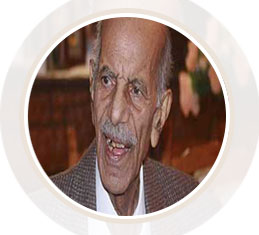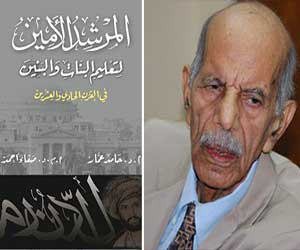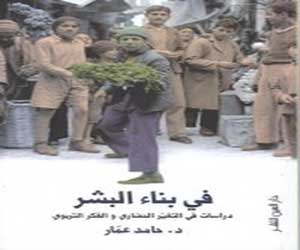Prof. Dr. Hamid Ammar
2021-03-11 |
||
Prof. Dr. Hamed Ammar, Sheikh of Egyptian Educators, is one of the Egyptian figures that makes us feel comfortable in its silent presence, who defies the lights despite their importance, and is one of the active figures in the history of Egyptian education.
Dr. Hamid Ammar published his autobiography in his book, "Paces… we traverse ... Between Poverty and Chance to the University Campus," which he considered "an amazing long journey ... from a primitive agricultural society and subsistence economy and being satisfied with its own resources, production and consumption, to the stage of the horizons of the globalization society and the information age."
He was called the sheikh of educators in Egypt and the Arab world because of his great scientific credit and his contributions to building the mind of society. He gained his position due to his own vision and a clear eye. His studies blended between the circles of society, history and education, and he aligned himself in his journey with the concerns of the homeland and the simple citizen, where he adopted the call for education for all.
Prof. Dr. Hamid Ammar is one of the academic leaders and one of the specialists in education in the Arab world, as he is the leading international expert in human development.
Dr. Ammar monitored the negative values that we should get rid of immediately in order to improve the state of our education, and also called for defining the positive values that we should focus on and strive to develop. In addition, Dr. Ammar linked education with all the behaviors of our lives, from food to the traffic system. All our problems stem from the absence of an effective educational system that contributes to building a civilized Egyptian person who depends on reason in solving his problem and does not count as superstition.
Dr. Ammar believes that strong education means a strong culture that contributes to global civilization and fulfills its value and requirements, and means economic and human development that pulls us out of the chasm of backwardness.
 |
||
Prof. Hamid Ammar's upbringing in the village of "Salwa" in Aswan, may be the cause of his interest in the educational process and education to this extent, his association with his village made him try to delve into the conditions of this village in an effort to reduce the problems it suffers as much as he can. He recorded his master's thesis on his village entitled " A study on unequal educational opportunities in Egypt, "followed by a doctoral thesis under the title" Social Upbringing in an Egyptian Village - Salwa - Aswan District "which he obtained from the University of London in 1952.
Dr. Ammar's thesis is considered the first doctoral thesis published for an Egyptian in the field of sociology of education, on a major American publishing house, and the demand for it continued from 1954 until 2003.
Education is the responsibility of the state in the first place
Dr. Ammar says that his thesis is the first doctoral thesis of an Egyptian envoy to British universities to be published as part of the education letters.
Dr. Ammar has many opinions related to education reform, among which is that education is primarily the responsibility of the state and must always remain a sovereign sector, such as the armed forces, the police, and foreign policy.
He also considered that hitting students in schools has become an educational and humanitarian taboo, and it has not been practiced for more than a century.
He added that what we know in comparative education is that developed countries in their books used to warn against resorting to any method of physical punishment for students, considering them among the factors of retardation in living standards and life in those countries, and he even attributed the occurrence of some problems related to students' verbal and physical abuse of their teachers to Exposing them to beating, in addition to not accepting access to information from the teacher and resorting to private lessons, and he added that beating students may have a lasting impact on their school and work life and on his growth as a citizen, and the emergence of the problem of street children.
Foreseeing education future and addressing its problems
Looking ahead to the future of education and addressing its problems was an obsession in the thought of the Sheikh of educators. Perhaps the most prominent characteristic of his work is its anticipation of this future and its treatment of its problems and its distinctiveness by its openness to Arab and international experiences and its interaction with it. Moreover, it indicates that Dr. Ammar is a well-informed reader who has gone beyond the critical view to propose visions to renew Arab education and develop its values, curricula, and its various dimensions.
Dr. Hamed is credited with discussing the concepts of sociology, the scientific method in his study of society, building the Arab human being, the national employment of social thought, human development in our Arab homeland, and the development of educational values, in addition to researching issues of the educational crisis, the concerns of education and culture, and leading the Egyptian educational thought, Addressing educational problems, social employment of education, educational renewal of culture, as well as future visions of education in our Arab world, educating the future, confronting globalization in education, culture and Arab nationalism in its historical framework and its educational demands, in addition to the role of education in Arab unity and social integration between partial solutions and the solution Nationalism, integration of knowledge, development of human capital, and inclusion of women in education.
Dr. Hamed also discussed the strategy for developing the status of women in the Arab community, the Arab strategy for comprehensive social development, the societal framework for the conditions of the population in Palestine, and the strategy for childhood and motherhood in Egypt.
Art education and free education
The educators' sheikh was interested in art education, as the arts are a major landmark of the Egyptian personality and its creativity. He also addressed the issue of "free education" in several series of articles. On the personal level, he mentions having to present a poverty certificate every year along with a certificate of academic excellence in order to obtain free education every year. And the extent of the humiliation and indignity he felt, and perhaps this feeling motivated him to record his first university thesis entitled (A Study on Unequal Opportunities for Education in Egypt) in 1947 at the University of London ... Therefore, Dr. Hamed emphasized that free education is the only hope for the openness of energy Live decent and progress.
Biography of the Educators’ Sheikh
It is worth noting that Professor Hamid Ammar holds a Bachelor of Arts (History) from Cairo University 1941, a Diploma in Education - Institute for Teachers ’Education - Cairo University 1942, and a Master’s in History - Cairo University 1945, then a Teachers’ Diploma - Institute of Education - University of London 1947, followed by Master of Education - Institute of Education - University of London 1949, PhD in Sociology of Education - Institute of Education - University of London 1952.
The Sheikh of Educators progressed in the jobs he assumed, as he was included in the teaching staff positions at the Faculty of Education, Ain Shams University - teacher - assistant professor - professor of pedagogy from 1952 - 1975, then head of the training department at the International Center for Community Development in the Arab World in Sars Al-Layan from 1955 to 1968. Then, head of the Department of Educational Studies: The Institute for Arab Research and Studies, the Arab Organization for Education, Culture and Science from 2003.
Professor Hamid Ammar has many contributions and scientific activities, including participation in establishing the International Center for Basic Education, which later turned into community development, then literacy and adult education from 1952 until 1986, and contributing to the establishment of the Institute of Social Work in Jordan 1970-1971, contributing to programs UNICEF Regional Office in Abu Dhabi from 1972 - 1974, Contribution to the establishment of the Social Work Training Center in Muscat - Oman, Jordan, Contribution to the document establishing the Arab Fund for Social Work of the Council of Arab Social Affairs Ministers in Tunis 1982, Contribution to the establishment of the National Council for Childhood Motherhood 1988 - 1991, Contribution to the establishment of the Department of Educational Studies at the Institute for Arab Studies and Research, Arab Organization for Education, Culture and Science 2001 - 2002.
Ammar published his first book "Field Work in the Countryside" in 1954, followed by books including "On the Economics of Education" 1963, "The Hurricanes of the Middle East and Their Political and Educational Implications" and "On the Perspectives of Contemporary Arab Education from Kindergarten to University" and "Teaching the Future from Bullying to Liberation, "facing globalization in education and culture," and "human development in the Arab world."
The achievements and innovations of the Sheikh of educators qualified him to obtain many prizes, the most important of which is the State Appreciation Award in Economic and Social Sciences of the Supreme Council for Culture 1994, the Kuwait Prize for Scientific Progress - Kuwait Foundation for the Advancement of Sciences 1994, the Prize for the Best Book in Educational Sciences at the Cairo International Book Fair, for the book (facing Globalization in Education and Culture), the prize for the best book in educational sciences at the Cairo International Book Fair, and the Ministry of Culture, 2004 for the book (On the horizons of contemporary Arab education from kindergarten to university), Mubarak Award in Social Sciences with a certificate and a gold medal from the Supreme Council of Culture. He also won the State Appreciation Award, the most prestigious award in Egypt at that time, and in 2008 Ammar won the Nile Prize in Social Sciences, which is the largest prize in Egypt.
Dr. Ammar passed away on Monday evening 10 December 2014 at the age of 93, leaving behind a scientific, cultural and intellectual legacy that subsequent generations remember and owe a lot to him.
 |
||


.svg)
